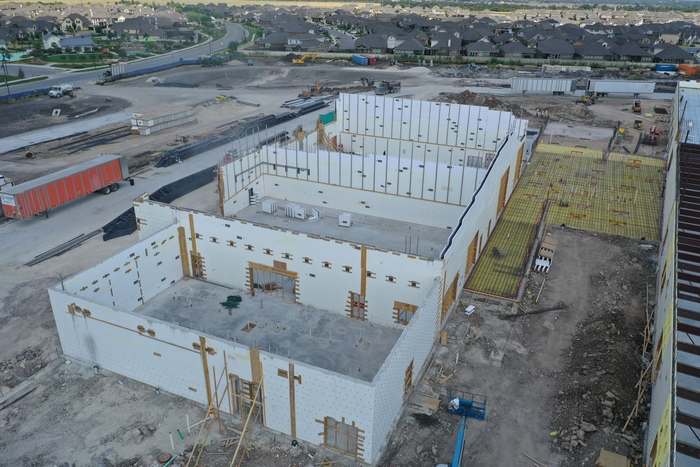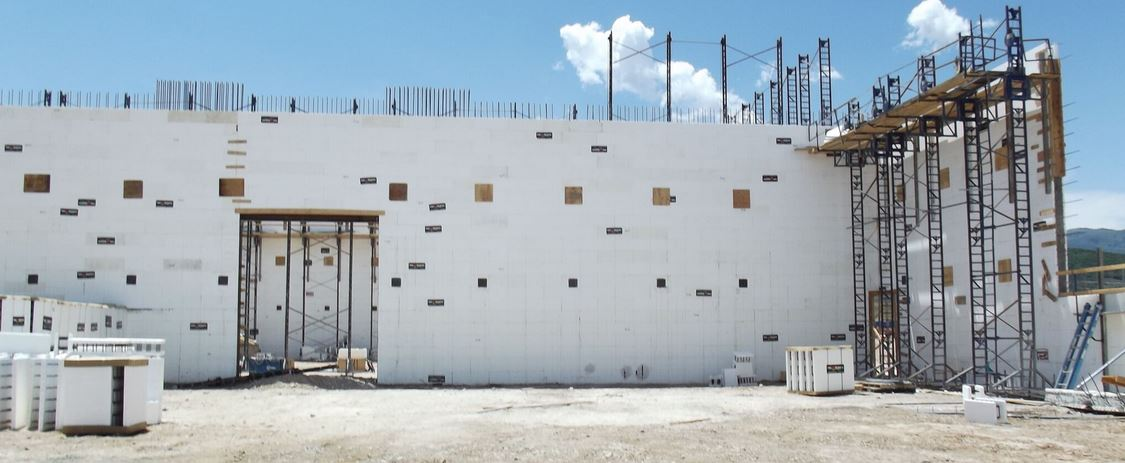
What is the Concrete Temperature Limit?

Concrete is a versatile and durable construction material that is predominantly used in both commercial and residential structures. It's essential to understand concrete's thermal properties, specifically its temperature limits, to optimize its strength and durability.
Awareness of temperature limits surrounding concrete and the impacts of deviating from those limits is essential to ensuring the concrete will perform as expected when used in construction.
Understanding Concrete Temperature Limits
The concrete temperature limit is crucial for maintaining its integrity and strength. The limits can vary depending on different standards such as the American Concrete Institute (ACI) code and ASTM standards.
Typically, the fresh concrete temperature limit is maintained between 10°C to 32°C (50°F to 90°F) to ensure optimal curing and setting.
Minimum Concrete Temperature Limit
The concrete cold temperature limit is vital to prevent freezing, which can lead to a compromised structure. The ACI specifies that the concrete low temperature limit should not fall below 5°C (41°F) during the curing period. The code emphasizes the importance of maintaining a conducive environment for concrete curing in cold weather. Concrete freezing greatly reduces the ultimate strength of the finished concrete.
Concrete Pouring Temperature Limits
When it comes to pouring concrete, maintaining the right temperature is pivotal. The temperature limits for pouring concrete are designed to ensure optimal flow and setting.
In cold weather, special considerations like using heated mixing water or insulated blankets are crucial to uphold the concrete temperature limit for cold weather and avoid detrimental effects on the concrete's strength and durability.
As with anything else, the concrete pouring temperature has to be just right. If the pouring temperature is too hot the concrete can become weak and lose durability. If the pouring temperature is too low, the concrete can set prematurely and become brittle or crack. Getting the temperature right leads to incredible strength and durability in the finished concrete.
Benefits of Using Concrete in Buildings
Concrete is renowned for its durability, strength, and versatility, which makes it a preferred choice for various construction projects. The benefits extend to both commercial and residential buildings for a robust and sustainable solution.
Strength and Durability
Concrete’s inherent strength and durability make it ideal for constructing buildings that can withstand natural disasters, extreme weather conditions, and the test of time. Its resistance to fire and environmental conditions contributes to its popularity in the construction industry.
Cost-Efficiency
Concrete structures often exhibit lower life-cycle costs, which can be attributed to their minimal maintenance requirements and long-lasting nature. This cost-efficiency is particularly advantageous for commercial buildings, where operational costs are a significant concern.
Sustainability
Concrete's sustainability is evident in its ability to be recycled and its energy efficiency. Concrete is also often made from locally sourced materials. It contributes to the creation of energy-efficient buildings, and reduces the overall carbon footprint and environmental impact.
Innovations: Insulated Concrete Forms (ICFs)

Insulated concrete forms represent a revolutionary technology in the concrete industry. ICFs are hollow blocks or panels made of insulating foam, filled with steel-reinforced concrete, and it provides several benefits:
Cold Weather
ICFs are insulated concrete forms that trap the heat within the wall assembly during the hydration period of the concrete. With proper application procedures the concrete will remain well above freezing temperatures during below freezing exterior temperatures. This enables construction to proceed all year round without delay from low temperatures. This insulated hydration period has proven to enhance the overall strength of the concrete.
Enhanced Insulation
ICFs provide superior insulation, to maintain a consistent indoor temperature and reduce energy consumption, making them an environmentally friendly option. The ICF blocks naturally form both interior and exterior layers of continuous insulation.
Improved Acoustic Performance
The insulating properties of ICFs also contribute to enhanced acoustic performance, for reduced external noise and to create a quieter, more comfortable living environment. The large mass of concrete in the building’s walls helps dampen any exterior noises from bothering the occupants inside.
Increased Fire Resistance
ICFs showcase exceptional fire resistance, by providing an added layer of safety and peace of mind for occupants. ICF blocks from Fox Blocks are even able to be used in fire-rated wall assemblies due to their fire resistance.
When Choosing Concrete, Choose Fox Blocks
Understanding the concrete temperature limit is indispensable for leveraging its full potential in construction. The adherence to the specified temperature limits, as per ACI codes, ensures the integrity, strength, and durability of concrete structures. Concrete's versatility and robustness extend numerous benefits to both commercial and residential buildings, which highlight its cost-efficiency and sustainability.

The advent of ICF blocks has transformed the industry, by offering enhanced insulation, acoustic performance, and fire resistance. These innovations underscore the multifaceted advantages of concrete, and reinforce its status as a staple for year round modern construction.
Explore the resilience and versatility of concrete with Fox Blocks. Their pioneering solutions, including state-of-the-art ICF blocks, are designed to meet your construction needs in hot or cold weather, and they provide unparalleled strength, durability, and sustainability.
Contact their concrete experts today to learn more about how their concrete solutions can elevate your next project and navigate the world of concrete temperature limits with ease and confidence.